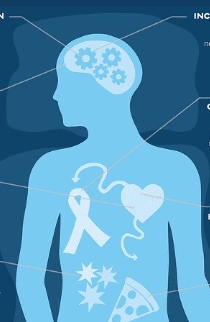Living a healthy life is about making mindful decisions that positively impact both your body and mind. With a focus on nutrition, physical activity, mental well-being, and preventive care, adopting healthier habits can lead to improved quality of life, greater energy levels, and better long-term health outcomes. It’s about making small, consistent changes to enhance both physical and mental health over time.
A balanced diet is one of the key foundations for a healthy life. Proper nutrition fuels the body, ensuring that it has the energy and nutrients needed to perform daily tasks. A healthy diet consists of a variety of foods, with an emphasis on whole, unprocessed foods. Including a wide array of fruits and vegetables provides essential vitamins, minerals, and antioxidants that support the immune system and fight off disease.
Incorporating lean proteins such as chicken, fish, beans, and tofu supports muscle growth and repair. Whole grains like oats, quinoa, and brown rice provide the body with complex carbohydrates that promote steady energy levels and support digestive health. Healthy fats, such as those found in avocados, nuts, and seeds, are crucial for maintaining brain function and promoting cardiovascular health.
Proper hydration is also essential for maintaining good health. Water plays a vital role in keeping the body hydrated, aiding digestion, regulating body temperature, and supporting detoxification. Drinking plenty of water throughout the day can also improve skin health, reduce fatigue, and enhance mental clarity. Avoiding sugary drinks and excessive caffeine can prevent unnecessary calorie intake and help maintain overall well-being.
Exercise is another vital component of a healthy lifestyle. Regular physical activity helps maintain a healthy weight, builds strength, and promotes cardiovascular health. It also plays an important role in boosting mental health by reducing stress and anxiety and improving mood. Aim for at least 30 minutes of moderate-intensity exercise most days of the week. Walking, cycling, swimming, or even dancing are excellent ways to keep the body moving.
Exercise can be tailored to fit your lifestyle and fitness level, whether through high-intensity workouts, yoga, or simply being more active throughout the day. Physical activity not only strengthens muscles and bones but also improves flexibility and joint health, which is particularly important as we age.
Sleep is another key element that cannot be overlooked. Sleep is when the body repairs and rejuvenates itself. It plays a critical role in memory consolidation, hormone regulation, and immune function. Most adults need between 7 and 9 hours of sleep per night for optimal health. A lack of sleep can affect cognitive function, mood, and even contribute to weight gain.
Establishing a consistent sleep schedule is essential for good health. Creating a calm and relaxing environment, avoiding caffeine or heavy meals before bedtime, and minimizing exposure to screens can all help improve sleep quality. Good sleep hygiene ensures the body has the chance to rest fully, which in turn supports better health during waking hours.
Mental health is just as important as physical health, and it’s essential to address both. Managing stress effectively, practicing mindfulness, and taking time for self-care are critical for emotional well-being. Chronic stress can lead to a variety of health issues, including cardiovascular problems, digestive issues, and weakened immunity. Incorporating stress-management techniques, such as meditation, deep breathing exercises, or journaling, can be very beneficial.
Building strong relationships with friends, family, and a supportive community can help promote mental health and provide emotional support during tough times. Regular social engagement can help combat loneliness and improve overall happiness. It’s important to reach out for help if you’re struggling with your mental health. Professional counseling or therapy can offer valuable tools and coping strategies.
Preventive health care is one of the most effective ways to stay on top of your health. Regular check-ups, screenings, and vaccinations can catch potential health issues early and prevent the onset of chronic conditions. It’s important to schedule regular visits with your doctor for routine health assessments, as well as blood pressure, cholesterol, and glucose checks.
Incorporating preventive health measures into your life—such as avoiding smoking, limiting alcohol intake, and maintaining a healthy weight—can significantly reduce your risk of developing serious health problems. Maintaining a healthy lifestyle can prevent the onset of chronic diseases such as heart disease, diabetes, and cancer, leading to a longer, healthier life.
Healthy living doesn’t require drastic changes, but rather small, consistent adjustments to your routine. By focusing on nutrition, staying physically active, managing stress, getting quality sleep, and prioritizing mental health, you can achieve a balanced life that supports long-term wellness. Remember, the key to health is finding a sustainable balance that works for you and sticking to it.




